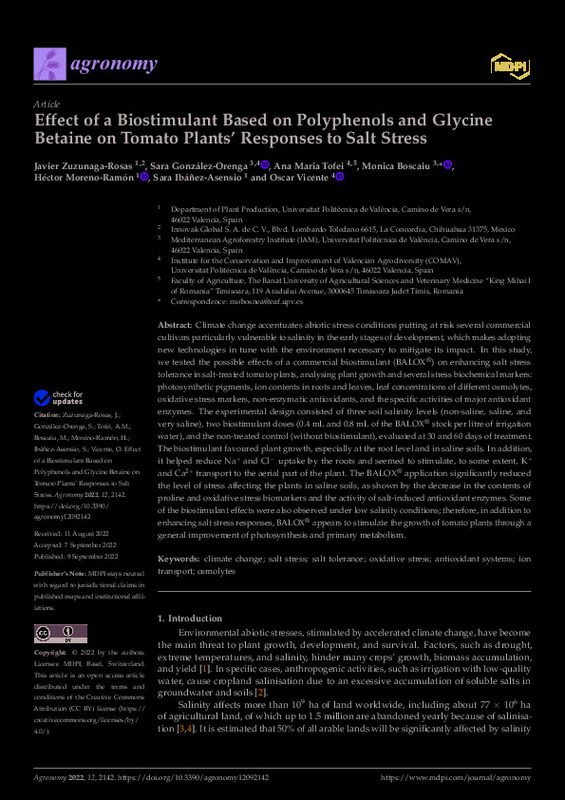JavaScript is disabled for your browser. Some features of this site may not work without it.
Buscar en RiuNet
Listar
Mi cuenta
Estadísticas
Ayuda RiuNet
Admin. UPV
Effect of a Biostimulant Based on Polyphenols and Glycine Betaine on Tomato Plants¿ Responses to Salt Stress
Mostrar el registro sencillo del ítem
Ficheros en el ítem
| dc.contributor.author | Zuzunaga-Rosas, Javier
|
es_ES |
| dc.contributor.author | González-Orenga, Sara
|
es_ES |
| dc.contributor.author | Tofei, Ana Maria
|
es_ES |
| dc.contributor.author | Boscaiu, Monica
|
es_ES |
| dc.contributor.author | Moreno-Ramón, Héctor
|
es_ES |
| dc.contributor.author | Ibañez Asensio, Sara
|
es_ES |
| dc.contributor.author | Vicente, Oscar
|
es_ES |
| dc.date.accessioned | 2023-05-24T18:01:45Z | |
| dc.date.available | 2023-05-24T18:01:45Z | |
| dc.date.issued | 2022-09 | es_ES |
| dc.identifier.uri | http://hdl.handle.net/10251/193565 | |
| dc.description.abstract | [EN] Climate change accentuates abiotic stress conditions putting at risk several commercial cultivars particularly vulnerable to salinity in the early stages of development, which makes adopting new technologies in tune with the environment necessary to mitigate its impact. In this study, we tested the possible effects of a commercial biostimulant (BALOX®) on enhancing salt stress tolerance in salt-treated tomato plants, analysing plant growth and several stress biochemical markers: photosynthetic pigments, ion contents in roots and leaves, leaf concentrations of different osmolytes, oxidative stress markers, non-enzymatic antioxidants, and the specific activities of major antioxidant enzymes. The experimental design consisted of three soil salinity levels (non-saline, saline, and very saline), two biostimulant doses (0.4 mL and 0.8 mL of the BALOX® stock per litre of irrigation water), and the non-treated control (without biostimulant), evaluated at 30 and 60 days of treatment. The biostimulant favoured plant growth, especially at the root level and in saline soils. In addition, it helped reduce Na+ and Cl uptake by the roots and seemed to stimulate, to some extent, K+ and Ca2+ transport to the aerial part of the plant. The BALOX® application significantly reduced the level of stress affecting the plants in saline soils, as shown by the decrease in the contents of proline and oxidative stress biomarkers and the activity of salt-induced antioxidant enzymes. Some of the biostimulant effects were also observed under low salinity conditions; therefore, in addition to enhancing salt stress responses, BALOX® appears to stimulate the growth of tomato plants through a general improvement of photosynthesis and primary metabolism. | es_ES |
| dc.description.sponsorship | This research was partly funded by the company Innovak Global and partly by UPV through internal funds to S.I.-A., M.B. and O.V. | es_ES |
| dc.language | Inglés | es_ES |
| dc.publisher | MDPI | es_ES |
| dc.relation.ispartof | Agronomy | es_ES |
| dc.rights | Reconocimiento (by) | es_ES |
| dc.subject | Climate change | es_ES |
| dc.subject | Salt stress | es_ES |
| dc.subject | Salt tolerance | es_ES |
| dc.subject | Oxidative stress | es_ES |
| dc.subject | Antioxidant systems | es_ES |
| dc.subject | Ion transport | es_ES |
| dc.subject | Osmolytes | es_ES |
| dc.subject.classification | BOTANICA | es_ES |
| dc.subject.classification | BIOQUIMICA Y BIOLOGIA MOLECULAR | es_ES |
| dc.subject.classification | PRODUCCION VEGETAL | es_ES |
| dc.title | Effect of a Biostimulant Based on Polyphenols and Glycine Betaine on Tomato Plants¿ Responses to Salt Stress | es_ES |
| dc.type | Artículo | es_ES |
| dc.identifier.doi | 10.3390/agronomy12092142 | es_ES |
| dc.rights.accessRights | Abierto | es_ES |
| dc.contributor.affiliation | Universitat Politècnica de València. Escuela Técnica Superior de Ingeniería Agronómica y del Medio Natural - Escola Tècnica Superior d'Enginyeria Agronòmica i del Medi Natural | es_ES |
| dc.description.bibliographicCitation | Zuzunaga-Rosas, J.; González-Orenga, S.; Tofei, AM.; Boscaiu, M.; Moreno-Ramón, H.; Ibañez Asensio, S.; Vicente, O. (2022). Effect of a Biostimulant Based on Polyphenols and Glycine Betaine on Tomato Plants¿ Responses to Salt Stress. Agronomy. 12(9):1-26. https://doi.org/10.3390/agronomy12092142 | es_ES |
| dc.description.accrualMethod | S | es_ES |
| dc.relation.publisherversion | https://doi.org/10.3390/agronomy12092142 | es_ES |
| dc.description.upvformatpinicio | 1 | es_ES |
| dc.description.upvformatpfin | 26 | es_ES |
| dc.type.version | info:eu-repo/semantics/publishedVersion | es_ES |
| dc.description.volume | 12 | es_ES |
| dc.description.issue | 9 | es_ES |
| dc.identifier.eissn | 2073-4395 | es_ES |
| dc.relation.pasarela | S\472585 | es_ES |
| dc.contributor.funder | Universitat Politècnica de València | es_ES |
| dc.subject.ods | 02.- Poner fin al hambre, conseguir la seguridad alimentaria y una mejor nutrición, y promover la agricultura sostenible | es_ES |








